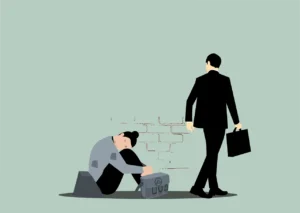Introduction
In an increasingly globalized world, political conflicts have become an unfortunate reality that affects the lives of countless individuals. Whether it’s the tension between superpowers, civil wars, or regional disputes, political conflicts can have a profound psychological impact on those who find themselves caught in the crossfire. This blog explores the intricate relationship between political conflicts and the psychological well-being of individuals, shedding light on the various ways in which fear, anxiety, and trauma can shape their lives.
Complex Nature of Political Conflicts
Before delving into the psychological impact of political conflicts, it’s essential to understand the complex and multifaceted nature of such conflicts. Political conflicts can arise from various sources, including territorial disputes, ideological differences, power struggles, and more. They can manifest at different scales, from interpersonal conflicts within families or communities to global power struggles that influence international relations. As these conflicts intensify, they often give rise to a sense of fear and uncertainty that pervades the lives of individuals directly or indirectly affected.
Fear of Physical Harm and Displacement
One of the most immediate and tangible consequences of political conflicts is the fear of physical harm. In regions plagued by violence, individuals often live in constant fear for their lives and the lives of their loved ones. The threat of violence can lead to pervasive anxiety and stress, which can have long-lasting effects on mental health. People may experience sleep disturbances, panic attacks, and a constant sense of unease.
Additionally, political conflicts frequently lead to displacement, with people forced to flee their homes and communities to escape the violence. This displacement exacerbates feelings of fear and uncertainty. Internally displaced persons and refugees often face precarious living conditions, economic instability, and a loss of social support networks. All these factors contribute to a profound sense of insecurity and helplessness.
Psychological Impact of Political Conflicts
The psychological impact of political conflicts can be profound and far-reaching. Some of the key effects include:
1. Post-Traumatic Stress Disorder (PTSD) and Trauma
Post-Traumatic Stress Disorder (PTSD) is a common consequence of exposure to violence and fear in political conflicts. Individuals who have experienced or witnessed traumatic events may develop symptoms such as flashbacks, nightmares, and severe anxiety. The persistent fear of a traumatic event’s recurrence can interfere with daily functioning and quality of life.
2. Anxiety and Depression
Living in a state of perpetual fear can lead to anxiety and depression. The chronic stress caused by political conflicts can overload the body’s stress response system, leading to a range of physical and mental health problems. Anxiety disorders and depression are among the most prevalent mental health issues that arise in the wake of political conflicts.
3. Loss of Trust and Social Isolation
Political conflicts can erode trust within communities and lead to social isolation. Individuals may become suspicious of others, fearing that they might be informants or potential threats. This loss of trust and social isolation can further exacerbate feelings of loneliness and hopelessness.
4. Economic Hardship
Economic instability often accompanies political conflicts, as businesses shutter, jobs disappear, and essential services are disrupted. This economic hardship can result in significant stress and anxiety, as individuals struggle to meet their basic needs and provide for their families.
5. Interpersonal Conflicts
Political conflicts can also spill over into interpersonal relationships. Differences in political beliefs and allegiances can lead to rifts within families and communities. These divisions can be emotionally distressing, as individuals may find themselves isolated from loved ones due to their differing political views.
Coping Mechanisms in the Midst of Conflict
Despite the grim picture painted so far, many individuals and communities find ways to cope with the psychological toll of political conflicts. Resilience is a common trait among those who endure such circumstances. Here are some coping mechanisms and strategies that people employ:
1. Social Support
Maintaining social connections and support networks is crucial for coping with the psychological impact of political conflicts. Sharing experiences, emotions, and fears with friends and family can provide a sense of belonging and reduce feelings of isolation.
2. Community Resilience
Communities often come together in the face of adversity. Collective action, mutual aid, and a sense of belonging to a resilient community can help individuals weather the storm of political conflict more effectively.
3. Psychotherapy and Counseling
For those struggling with severe psychological distress, professional help in the form of psychotherapy or counseling can be essential. These interventions can provide individuals with coping strategies, emotional support, and a safe space to process their experiences.
4. Mindfulness and Meditation
Practices like mindfulness and meditation can help individuals manage stress and anxiety. These techniques encourage living in the present moment and can be particularly beneficial for those grappling with the uncertainty and fear associated with political conflicts.
5. Advocacy and Activism
Some individuals find solace and empowerment in advocating for change or taking an active role in addressing the root causes of political conflicts. Engaging in activism can provide a sense of purpose and agency in an otherwise dis empowering situation.
International Support and Aid
The international community plays a crucial role in supporting individuals affected by political conflicts. Humanitarian organizations and foreign aid can provide essential resources, including food, shelter, medical care, and psycho social support. Additionally, diplomatic efforts to resolve conflicts and promote peace are vital in preventing further psychological trauma.
Moving Toward Healing and Reconciliation
Healing and reconciliation are essential steps toward mitigating the long-term psychological impact of political conflicts. These processes require a multifaceted approach that addresses both individual and collective trauma:
1. Truth and Reconciliation Commissions
In some cases, Truth and Reconciliation Commissions can help communities confront their past, acknowledge the wrongdoings, and work toward forgiveness and healing. These commissions have played a significant role in post-conflict societies, such as South Africa.
2. Education and Awareness
Promoting awareness about the psychological impact of political conflicts is crucial for reducing stigma and facilitating healing. Education can help individuals understand the root causes of conflicts and the importance of empathy and support for those affected.
3. Psycho social Support
Continued psycho social support is essential for individuals struggling with the long-term effects of political conflicts. This support can include therapy, support groups, and community-based programs that foster resilience and healing.
4. Conflict Resolution and Peace building
Efforts to address the root causes of political conflicts and promote peace can significantly reduce the psychological toll on affected individuals. Diplomacy, conflict resolution, and peace building initiatives aim to create stable environments where individuals can rebuild their lives.
Conclusion
Living in fear due to political conflicts can have a profound and lasting impact on individuals. The psychological consequences, including PTSD, anxiety, depression, and interpersonal conflicts, are widespread and often overlooked. However, with the right support and interventions, individuals and communities can find ways to cope, heal, and rebuild their lives.
Addressing the psychological impact of political conflicts is not only a humanitarian imperative but also a strategic one. Fostering the mental well-being of individuals affected by conflict is essential for promoting stability, peace, and long-term resilience. It is a testament to the strength of the human spirit that, even in the face of overwhelming fear, people find ways to persevere, heal, and work toward a better future.







1,045 responses
Spot on with this write-up, I absolutely believe this web site needs far more attention. I’ll probably be back again to read more, thanks for the information.
Ola, jogadores!
Enquanto jogava em jogos virtuais de apostas, percebi que o fundamento para um desempenho bem-sucedido e seguir um plano claro.
Artigos que se tornaram indispensaveis para mim:
https://landing.nhovn.com/betnacional-o-melhor-apostador-online/
Esses materiais me ajudaram a jogar com mais eficiencia. Eles abordaram topicos como volatilidade das maquinas, o que me permitiu jogar com mais confianca. Se voce tambem quer dominar estrategias, recomendo estudar os conselhos de especialistas. Esse e o seu primeiro passo rumo a um estrategia vencedora.
Que a sorte esteja com voce!
Your style is very unique in comparison to other folks I have read stuff from. Thank you for posting when you have the opportunity, Guess I’ll just book mark this blog.
This is the right website for anybody who hopes to understand this topic. You understand so much its almost hard to argue with you (not that I personally will need to…HaHa). You certainly put a fresh spin on a topic which has been written about for many years. Wonderful stuff, just great.
Having read this I believed it was extremely informative. I appreciate you spending some time and energy to put this informative article together. I once again find myself personally spending a significant amount of time both reading and posting comments. But so what, it was still worth it.